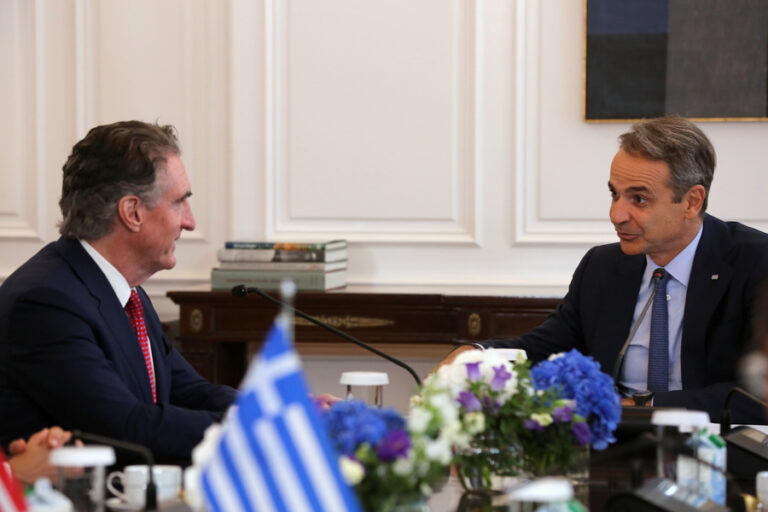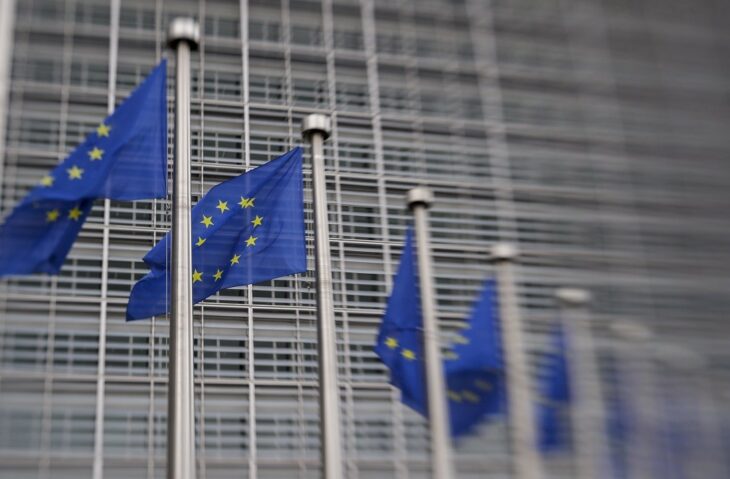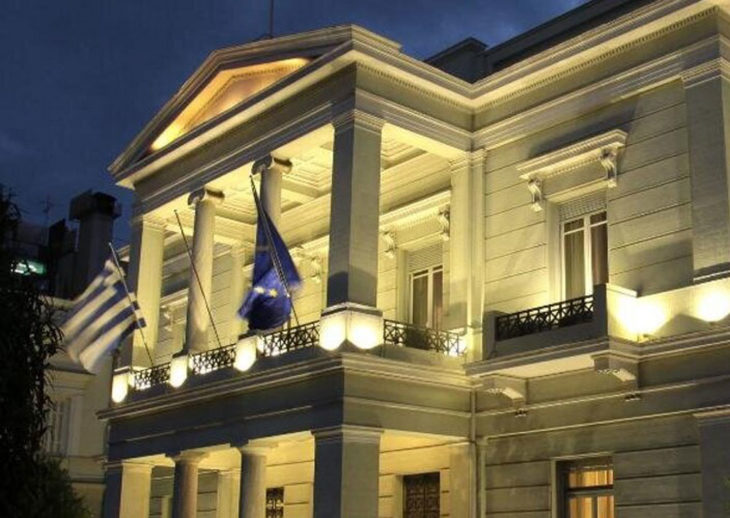
ENGLISH SECTION
15/09/2025 | 16:11
Mitsotakis: Countries that threaten EU members with war cannot participate in the European defense architecture
Prime Minister Kyriakos Mitsotakis expressed the EU’s support for the Polish partners who defended the Union’s eastern borders against an open violation of their airspace, after his meeting on Monday with the President of the European Council Antonio Costa.
“As members of a strong Europe that does not give in to revisionism, we must also demonstrate on the ground that no violation of sovereignty and sovereign rights can be tolerated. For the Ukrainian issue, we express our support for the understanding between the EU and the US to end the war and start peace talks. A discussion with the participation of Ukraine and based on the fundamental provisions of international law, the inviolability of borders and with the necessary security guarantees,” the prime minister stressed.
Mitsotakis noted that they discussed with the President of the European Council developments in the wider region, in the Middle East.
“We actively support the efforts for negotiating a ceasefire. They are being made by America, Qatar and Egypt. We are concerned after the impermissible violation of Qatar’s territorial sovereignty and I underlined this to the Emir. I stressed that any escalation in Gaza must be avoided. Greece has long been offering significant humanitarian aid, including humanitarian material,” the prime minister underlined.
He said that they also discussed joint defence and the perspective that Greece supports, believing in the concept of the Union’s strategic autonomy.
“In light of the recent events in Polish airspace, I reiterate the need for a common European financial instrument for defence purchases of common European interest, such as missile defence. I believe that the time is right for this discussion to take place and we will hold it in the next discussions of the European Council. Regarding the participation of third countries in the new EU defence initiative, our position is clear. Countries that threaten EU countries with war cannot participate in the European defence architecture,” stressed Mitsotakis.
The prime minister said that they also talked about migration, an issue that – he said – has consequences for society, the economy and the security of the whole of Europe.
“After a period of calm, we have had significant arrivals in the last 48 hours in Crete. This reaffirms the need for more coordinated protection of the EU’s external borders in order to deal more effectively with the networks of smugglers,” he added.
Regarding the next multi-annual budget, Mitsotakis said that Greece is coming with a plan and clear goals, as well as a positive attitude towards the Commission’s proposals. He noted that it will be a difficult discussion and welcomed the will to complete this by the end of 2026 at the latest.
Talking about the competitiveness of the EU, the prime minister stressed that Greece places emphasis on the creation of a real common energy market, which will mean similar energy prices for all member-states. In this regard, he said that there is a lot of work to do, a need to invest in the necessary interconnections and for energy flows from cheaper countries to those that need it most.
“We express the hope that the obstacles will be temporary and the bonds we forge will be permanent. Our commitment is to a strong Europe that will serve all Europeans,” he added.
Responding to a question about competitiveness and the Draghi report, Mitsotakis said that European leaders mostly expressed positive views about Draghi’s bold proposals to bridge the competitiveness gap, especially with the US.
“At that time, some expressed reservations about the possibility of translating the recommendations into practical policies. We have not taken enough steps in this direction. I am sure that the President of the European Council shares this feeling,” he said.
He added: “We welcome the European Commission’s initiative to simplify and reduce bureaucracy. However, there are delays. In the common energy policy, some steps have been taken, but we have not yet concluded how we will supervise the single European energy market, nor how we will finance the necessary interconnections. We have been discussing the issues of the banking union for 10 years. Substantial progress has not yet been made. Greece is proving in practice that it is not afraid of foreign banks investing in Greek ones. I cannot say the same for all European countries.”
Europe needs unity, EU Council President Antonio Costa says
Europe needs unity in order to be strong, Costa emphasised in his meeting with the prime minister in Athens on Monday. Thanking Mitsotakis for receiving him, Costa said his visit to Athens was very important, since the Union’s institutions “need to come closer to citizens”, while adding that leaders and nations were important in this effort.
“We need you all to build unity because unity is our strength,” he said.
Costa congratulated Greece for all that has been achieved in the last decade, saying the country’s recovery was impressive. “Now your priorities are competitiveness and security. Nothing can be done, however, without some elements of macroeconomic policy. You have succeeded in these and they are very important for the Eurozone. Now we are focusing on security and competitiveness. You must offer confidence to investors to boost the economy because it is very important to know that we can invest safety but this cannot happen without a strong economy,” he added.
Talking about security, the European Council president noted, the first thing that comes to mind is the threat from Russia on the eastern border. “However, we cannot forget that we have other borders that need to be protected, from Cyprus to Finland and from Portugal to Romania. The management of our borders need to be improved so that we can tackle illegal migration and traffickers and we need a strong European migration policy,” Costa said.
He agreed with Mitsotakis on the need for joint funding of a common European defence, noting the 150-billion-euro financing programme but also the need for more common action.
“Military spending must increase significantly,” Costa said, stressing the need to ensure good joint funding from a common fund, which requires a stronger economy.
Among others, he noted the need to increase the size of European defence companies and improve the EU defence industry, while highlighting that Greece “is located in a very important geostrategic position, it is the bridge between Europe and the Middle East.” All that is happening in the Middle East creates problems in Europe in terms of stability and migration flows, he added, so that the area requires attention.
On the prospect of common borrowing, Costa replied that a common EU defence will also require common financing:
“Four years ago, no one was talking of a common defence in Europe,” he pointed out, but after Russia’s attack “we support Ukraine economically and militarily.”
“There is the programme of 150 billion euros in loans to member-states for defence. We need more, also in common. The next multi-annual financial framework is an opportunity to decide what and how it should be funded,” he added.
source ANA-MPA









